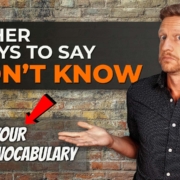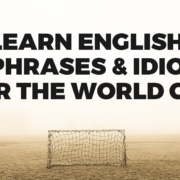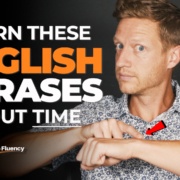Get is a power word in the English language.
There are so many different meanings. This might be confusing for you as an English learner. But it’s important to learn how to use this word.
In this lesson, you’re going to learn 10 of the most common ways this word is used. And then, I’m also going to share some idioms with you.
The key to all of this is to learn the sentences. That way, you will internalize this word and how to use it. Learn more about to do that at the bottom of the post.
For now, watch the video and then take the lesson below.
10 Ways to Use the Word GET in English
Here are the ways in which we use get in English. Read the definitions and the examples. And then, see the collocations and idioms too.
Gain possession of / buy
Look behind me. Recently, I got some new things for my office. I got these *cough* fake plants, neon light, wall decorations… this means that I bought these things. Here are more examples:
- What did you get for your birthday?
- I’m thinking about getting a new car soon.
- I haven’t got my wife anything for Christmas yet – I’m starting to panic!
To become ill or have an illness
Yes, you can say catch a cold but it’s more common to say get a cold. Here are more examples:
- I’ve got a cold
- She keeps getting sick
- I’ve got a bit of a headache today.
Click here to learn more about sickness vocabulary. Or watch below:
To obtain and/or bring something to someone
This is something that is used a lot at home. For example:
- Could you get me a tea?
- Could you get me the remote?
- If you have time, get me some bananas on your way home (first conditional)
- Get some breakfast and then we’ll go
An alternative here is to bring up or down. For example, could you bring me up a cup of tea?
To hear or to understand
Listen to this: Time flies like an arrow, but fruit flies like a banana. You can respond to that by saying, “I’m sorry. I didn’t quite get that.”
- I don’t get what you mean. Could you explain that again?
- I didn’t quite get that – could you speak up?
To become (change)
This is really useful. Look at this example:
- It’s getting dark
It’s not dark now but it’s changing from light to dark. We use get to talk about a change.
- Your tea’s going getting cold. I’d drink it now*
- It’s getting hot out there
- Yawn. I’m getting tired.
*My wife and I talk about PDT: perfect drinking temperature. This is when the tea isn’t too hot and it’s too cold. It’s just right.
To learn more about how to talk about the weather, click here.
Movement
A good example of this is this one:
- What’s wrong with you? Why are you hobbling?
- I stubbed my toe getting into bed.
Here are more examples:
- Get down!
- Get your hands out of your pockets.
- I stubbed my toe getting into bed
- Let’s get outside – it’s beautiful out there
To leave public transport
After you get on a train you… get off it.
- Let’s get off here
- Where do we get off if we’re going to Big Ben?
- Get off at the next stop
This can be a little confusing. Because you get out of a car but get off a train. You get in the car but on a train.
This is why it’s important to learn English through sentences. And if you want to get audio sentences from this lesson – along with flashcards and many other resources – join TFP.
Arrive
Now speaking of traveling, when you arrive at your destination, you can use get here too.
- When is David going to get here?
- When mum gets here, turn off the TV, okay?
- Come on, let’s get going, we’ll get there really late otherwise.
- I hope my package gets here today.
To Receive or Be Given Something
- Let me know what you get in that quiz
- I got my hair cut yesterday – what do you think?
- I got my acceptance letter yesterday!
Collocations with Get
Collocations are simply two or more words that go together naturally. For example, you take a quick shower not a fast shower.
Now, some of the following can be explained through rules, but it’s important to learn them more naturally. To internalize them and to be able to use them instantly during natural conversation.
With that in mind, here are some of the more common collocations with get:
Get Married
This means to be joined in marriage. Notice the difference between to be married and to get married from the following examples:
- They got married last year
- They’re married
The first one talks about the act of getting married. The second focuses on the situation. Here are more examples:
- When are you going to get married?
- We’re getting married next year
That last example is in the present continuous. We use the present continuous to talk about future events.
Get Ready
There are two definitions here. Firstly, it can mean to put on clothes. For example, come on, get ready. We have to leave soon. Here are more examples:
- It takes her forever to get ready
- How long does it take you to get ready?
- I’m getting ready – almost done!
It can also mean prepare. Imagine that you’re throwing a party for the World Cup Final. You might say, we need to get the house ready for our party. Here are more examples:
- Can you get the presentation ready for tomorrow?
- Get ready… this is going to be a tough exam.
Get home/in
Before, you learned that we use get when we arrive somewhere. To get home is a good example of this:
- Come on, let’s get home
- What time did you get in last night?
- Is he getting home tonight?
Get some/any sleep/rest
Let’s get home and get some rest. This just means to sleep or to rest. We often use some/any in between get and sleep/rest. Here are more examples:
- I just need to get some sleep
- Do you think we’ll get any rest next week?
- I didn’t get any sleep last night
Get into trouble
Look at this example: He’s always getting into trouble! This means that he’s always misbehaving and either their parents, the police, or their teachers are punishing them.
Here are more examples:
- He got into a lot of trouble as a kid but he’s good now
- Try not to get into trouble tomorrow!
- What can we do to stop you from getting into trouble?
This can also mean to fall into difficulty.
- If you get into any trouble when traveling, call me straight away!
- We got into some financial trouble last year but we managed to get out of it.
Idioms with the Word Get
There are many idioms that include get. Let’s have a look at some of these now.
Get to the bottom of something
This means to discover the truth about something – often when the truth is hidden or hard to find.
It’s used in formal situations, mainly. For example, if things have gone missing at a school but no one knows why, the principal might say: we need to get to the bottom of this.
More examples are:
- The police are trying to get to the bottom of who committed that crime
- Let’s get to the bottom of this, ASAP
Get the hang of
This means to learn how to do something. For example, it didn’t take me long to get the hang of driving on the right side of the road. Or the wrong side…
- It might take you a little time to get the hang of how to use get but if you follow my methods you’ll definitely get there
- I just can’t get the hang of it
Get a kick out of something
To enjoy something – to find something amusing.
- Are you getting a kick out of me falling over?
- I still get a kick out of Blackpool losing
Over to You
There’s a lot to learn in this lesson. Knowing how to use GET can help. But the key to being able to use these sentences naturally, flexibly and fluently when speaking is to repeat the phrases until you memorize them.
That is where my program can help. You can get premium resources based on this lesson here. We’d love to have you!
Thank you for reading. Please share this lesson below!








